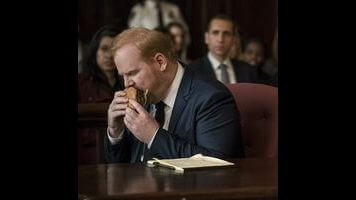The Jim Gaffigan Show returns for more of the same (and that’s a good thing)

“The Trial,” the second episode of The Jim Gaffigan Show’s second season, should be, for all intents and purposes, unwatchable. On paper, it sounds horrific: A white man tries to explain why he shouldn’t be scrutinized for making a mildly offensive joke that the public latches onto and freaks out about. But “The Trial” is not insufferable. It’s cute and funny, and a little bit cheesy. But that’s where Jim Gaffigan’s strength lies as a sitcom lead. He has the ability to take these subjects — the concept of the sitcom dad, faith — and reframes them in a way that doesn’t feel rehashed or even expected. Other sitcoms have dealt with an overly “PC” — to use a loaded term — culture, but few end with the white male protagonist saying, yeah, he did something dumb, but he’s learning and isn’t that great? The first season of The Jim Gaffigan Show largely followed this pattern as well, and the first two episode of the second point to a similar direction. That’s certainly a good thing for one of the most delightful surprises of last year’s TV season.
To be sure, some concepts are remixed better than others. “The Trial” works in how it juxtaposes the surreal, dream-like aspects that Gaffigan and celebrity cameos with real life concepts. “The Calling,” the premiere episode of the second, has its moments but doesn’t stick its landing quite as well “The Trial.” But its inciting character is another example of how the show has been able to subvert traditional sitcom tropes. Tongayi Chirisa’s Father Nicholas could have been a cringe-inducing character, the only regular person of color in the cast and a man of god, no less. But instead of being an accented rube, Father Nicholas’ peccadilloes are more in Jim’s mind than they are apart of the character himself, a former soccer star and Benetton model. Jim ascribes this notion of obligation onto Father Nicholas, but he still pays attention to him and respects him. It’s one of the ways that Gaffigan’s inclusion of his religion and beliefs into the fabric of his own show — and stand up for that matter — feels fresh and not off-putting to the non-religious (such as your fearless recapper) because it’s more of an aspect of his life than some overarching theme. Faith is a part of him, it is not his entire being.
Jeannie invites Father Nicholas to dinner (“Jim, us having him for dinner is the least we can do.” “Actually us not having him for dinner is the least we can do.”), leading to Jim to wonder what his calling is in life. After much thought, and an assist from Jerry Seinfeld, Gaffigan decides his calling is comedy (even if it’s not really). One of the best aspects of The Jim Gaffigan Show is often Ashley Williams’ Jeannie, and while the first two episodes don’t give her a whole lot to do, the first season set a precedent for allowing Jeannie to be just as funny as it allows Jim to be. She’s right not because she’s a nag, like other sitcom wives, but because she’s right. At one point, Jeannie says to Jim in a breathy voice, reiterating the episode’s theme, “Everyone has a calling. You just have to listen for it.” Jim instantly replies “Don’t be weird.” It’s this great little interplay but it also take the self-seriousness that religion and faith can bring. Religion is just a part of Jim’s life, it doesn’t define it.

 Keep scrolling for more great stories from A.V. Club.
Keep scrolling for more great stories from A.V. Club.